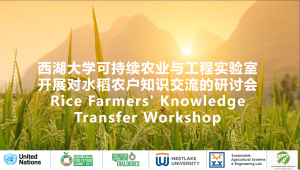Compte-rendu officiel des Concertations pour le Sommet des Nations Unies sur les systèmes alimentaires 2021
Type de Concertation
Coordonnateur
Langue de l'événement de Concertation
Date/heure
À:
Ville
Cible géographique
Format
Veuillez consulter les détails ci-dessous pour obtenir des renseignements sur l’inscription, s’ils sont disponibles, ou communiquer avec le coordonnateur si vous souhaitez y assister.
Animateur
Description
Smallholder farmers are the pillar of food production globally especially in developing countries (Lowder, Skoet, & Raney, 2016) and the most vulnerable to exacerbated climate impacts (FAO, IFAD, UNICEF, 2018). However, many research findings to support farmer livelihoods are unable to provide practical solutions, because the knowledge does not reach small-scale farmers (Editorial of Nature Plants, 2020). This is often due to a lack of understanding farmer issues, communicating through the wrong channels, or not providing the knowledge needed (Editorials of Nature, 2020). As a consequence, weak policies have been persisting which perpetuate unsustainable agricultural practices, causing harm to the environment, and making it difficult to mitigate severe hunger and poverty among smallholder farmers (FAO, IFAD, UNICEF, WFP, & WHO, 2021). Facing these issues with global implications, international organisations, industries, and governments have limited contact with farmers directly to help them to solve their most pressing issues. To fill this gap, we developed the knowledge transfer project to develop technology tools to transfer the knowledge efficiently and understand farmers’ issues globally (especially related to climate change) along with their knowledge requirements.
For this dialogue, we will convene rice farmers representatives in Yuhang area, Hangzhou city, Zhejiang province, China. Our overall objective is to determine the most effective way to contact the farmers and to disseminate the knowledge they need to improve their livelihoods. We also aim to understand the issues that smallholder farmers are facing related to climate impacts on crop management, yields, and livelihoods along with the knowledge that they need to solve the issues to ensure that the knowledge that we disseminate will match to their needs. Therefore, the dialogue will be divided into two parts: i) the communication tools to best deliver this knowledge and ii) identify their issues and knowledge needs.


